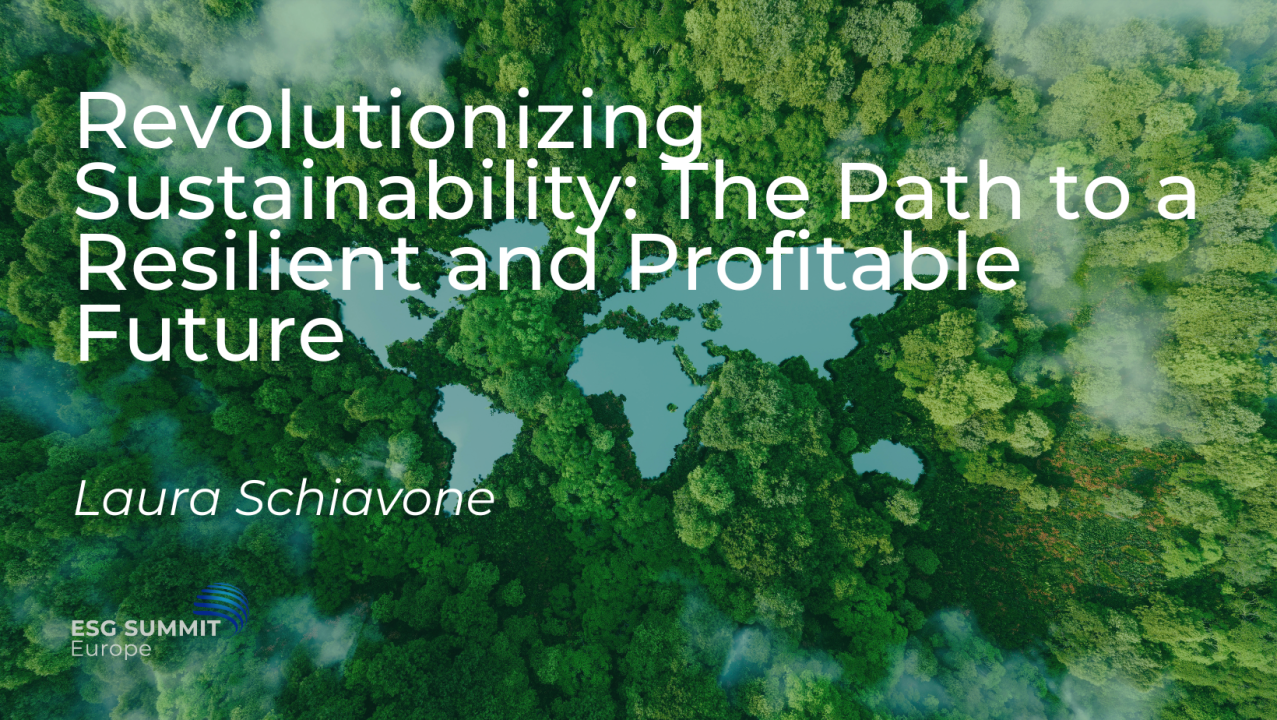
Revolutionizing Sustainability: The Path to a Resilient and Profitable Future
ESG Summit Europe
#SustainabilityInAction #DrivingChangeTogether #GuardiansOfThePlanet
“Sustainability is carrying out activities achieving a balance between the economic, respecting the environmental and social factors”
Sustainability has become a fundamental pillar for future development in an increasingly environmentally and socially conscious world. The integration of Environmental, Social, and Governance (ESG) criteria into business practices is essential to address global issues and promote positive change. Today, we have the privilege of hearing from Marìa Laura Schiavone , a prominent ESG Risk Analyst, who will share her unique perspective and experiences in this ever-evolving field.
When asked how she defines sustainability and why she believes it is important in today's world, Schiavone states, "In my opinion, sustainability involves conducting activities that achieve a balance between the economic, environmental respect, and social factors. It is important nowadays as the world is increasingly aware of the severity of climate change and its impacts on the environment and society."
Exploring the most relevant opportunities in sustainability in the coming years, María Laura highlights, "the greatest opportunity lies in achieving a more robust transition to sustainable economies, resulting in reduced environmental impact, enhanced reputational image, and lower costs for companies." As a thought leader and expert, María Laura aims to address this opportunity through her experience and knowledge, working with organizations to drive positive changes in their business practices.
When asked about the biggest challenge she has faced in the field of sustainability, Schiavone shares that the greatest challenge was getting different areas within a company to understand the need for sustainable management. However, she emphasizes that overcoming this challenge requires teamwork and collective effort to gradually grasp the importance of this comprehensive perspective.
María Laura takes pride in her contribution to integrating climate change analysis into business and project management. This innovative approach has had a positive impact on her industry and community, encouraging other organizations to consider environmental aspects in their business decisions and raising awareness about the importance of sustainability.
Regarding emerging trends that will significantly transform business practices in the coming years, María Laura highlights climate change analysis. According to her, this perspective will become a cornerstone for organizations seeking to adapt to environmental challenges and capitalize on opportunities within the realm of sustainability. Additionally, she emphasizes the role of technology in driving and improving sustainable solutions, underscoring the need for innovations that promote a low-carbon economy, energy efficiency, and reduced energy consumption.
领英推荐
Schiavone recognizes the transition to a circular economy and the adoption of regenerative practices as a key opportunity in pursuing sustainability. "This provides us with an opportunity to reduce resource utilization, generating a lower environmental and social impact," she emphasizes. By embracing circular and regenerative approaches, companies can contribute to environmental protection and the creation of more sustainable communities.
ESG reporting and corporate transparency play a crucial role in sustainability. According to María, this contributes positively as stakeholders, such as society and investors, demand more information about ESG efforts to make informed consumption and investment decisions. Transparent disclosure allows companies to demonstrate their commitment to sustainability and build strong relationships with their stakeholders.
When asked about the potential benefits for companies that prioritize ESG and sustainability, Schiavone highlights improved transparency, better stakeholder engagement, and enhanced identification of market risks and opportunities. By integrating ESG criteria into their operations, companies can strengthen their financial performance and reputation, gaining a competitive edge and ensuring long-term success.
Companies must take concrete actions to ensure genuine sustainability and avoid greenwashing or misleading claims. María suggests obtaining certifications and undergoing external reviews as a way to support claims and demonstrate a genuine commitment to sustainability. Credibility and accountability are crucial in building trust among consumers and stakeholders.
Companies can demonstrate social responsibility and make positive contributions to the communities they operate in through various initiatives. Schiavone emphasizes the importance of partnering with international best practice initiatives as an innovative way to showcase commitment to sustainable development and promote social well-being.
Addressing the challenges of implementing ESG-promoting legislation, María Laura emphasizes the need for greater dialogue to ensure compliance by companies. Regarding sustainable investments, she highlights how they offer an opportunity to improve environmental and social management within companies, as well as enhance reputational image.
In summary, sustainability has become an imperative for building a better future. Through María Laura Schiavone's valuable insights, we have explored key topics in sustainability, from the personal definition of this concept to the associated opportunities, challenges, and business benefits. As we move towards a sustainable future, companies and leaders need to embrace the responsibility of integrating ESG criteria into their practices and driving positive change for the benefit of our society and the environment. With the passion and expertise of professionals like María Laura, we are one step closer to achieving a sustainable and balanced world for future generations.